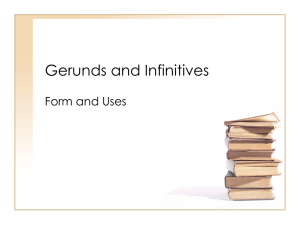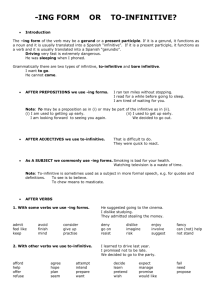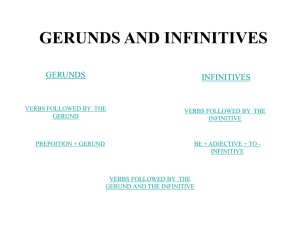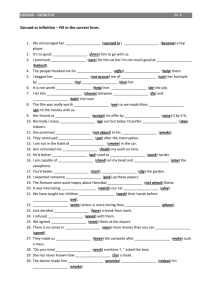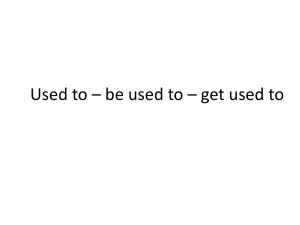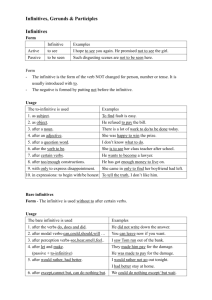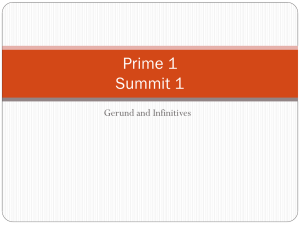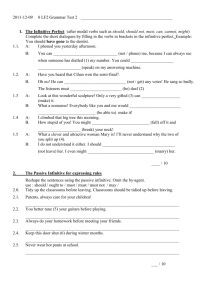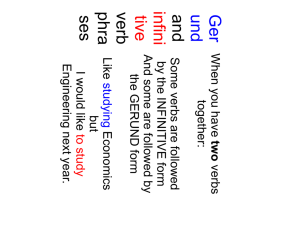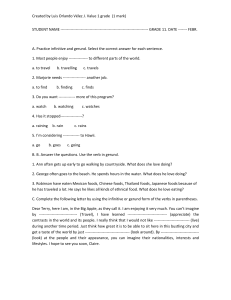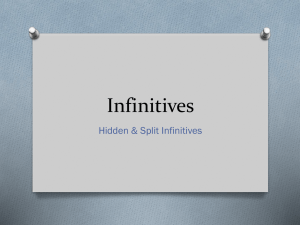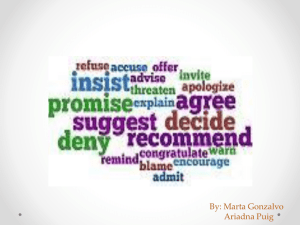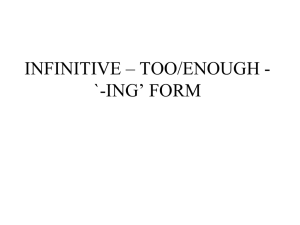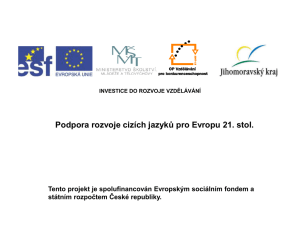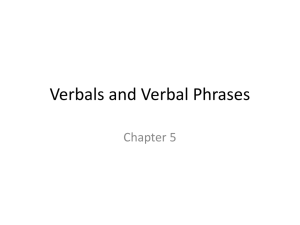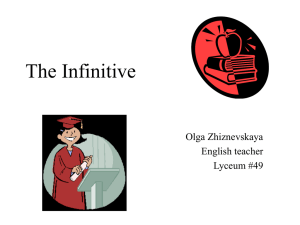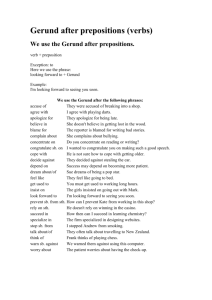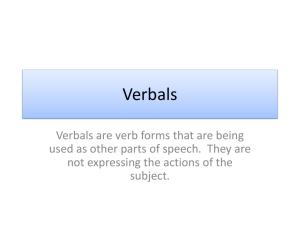GERUND vs INFINITIVE
advertisement
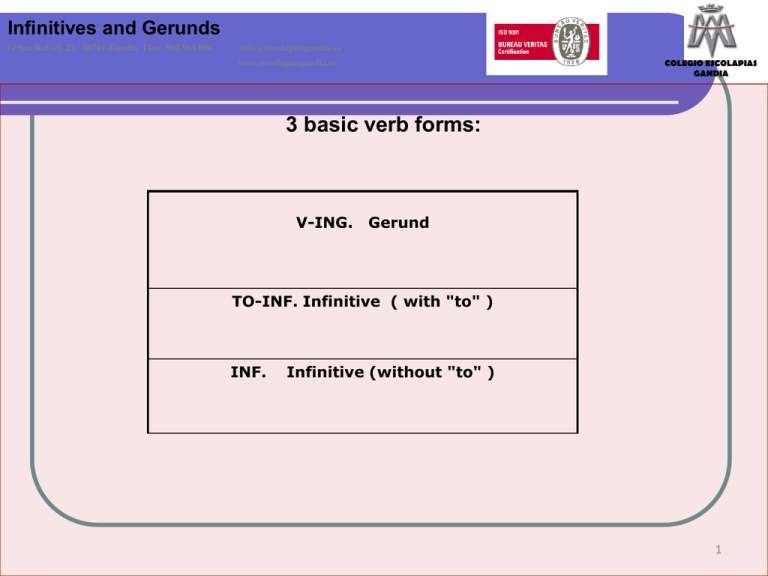
Infinitives and Gerunds C/ San Rafael, 25 46701-Gandia Tfno. 962 965 096 info@escolapiasgandia.es www.escolapiasgandia.es COLEGIO ESCOLAPIAS GANDIA 3 basic verb forms: V-ING. Gerund TO-INF. Infinitive ( with "to" ) INF. Infinitive (without "to" ) 1 USES OF THE GERUND: (V-ING) 1.- The gerund is used as a noun: Smoking is bad for your health. Her hobby is painting. 2.- It´s used after prepositions: Touch your toes without bending your knees. After swimming I felt cold. He is thinking of NOT going abroad. 3.- After verbs such as: FINISH ENJOY MIND INVOLVE NEGLECT IMAGINE GIVE UP DENY MISS AVOID GO ON KEEP ON APOLOGIZE PUT OFF ADMIT FOR POSTPONE SUGGEST INSIST ON * DENY / REGRET / SUGGEST + THAT + SUBJECT + VERB 4.- After certain idiomatic expressions: THERE / IT´S NO USE ( no merece la pena) CAN´T HELP (no poder evitar) BE FED UP WITH (estar harto de) CAN´T STAND (no poder soportar, aguantar) CAN´T BEAR (no poder soportar) FEEL LIKE (apetecer) GO +ing (para actividades de recreo): Go hiking/ dancing. IT´S ( NOT ) WORTH sightseeing ( no merecer la pena) THERE IS (NO) POINT IN (no hay necesidad de) TO BE USED TO (estar acostumbrado a) LOOK FORWARD TO (desear) PREFER+gerund TO+gerund (preferir__________ a __________) NEED (en sentido pasivo): Your car needs cleaning. It´s no worth wasting your time. She was used to getting up early. I´ m looking forward to hearing from you. I prefer going out to staying here. USES OF TO-INFINITIVE 1.- Infinitive of purpose. Why did you go out? To post a letter. We shouted to warn them of the danger. *Knives are for cutting. (in a general sense) 2.- Verbs with to-infinitive. AGREE MANAGE HOPE APPEAR LEARN PROMISE ARRAGE PRETEND I hope to pass my exams. We decided not to go to Paris. AFFORD PLAN REFUSE SEEM DECIDE OFFER * Verb + wh-word + To-INF. (ask / decide / know / remember / forget / explain / understand ) We decided when to go /we could go to Paris. 3.- Verb +( Complement ) + TO-INF. WANT ASK ADVISE HELP TELL EXPECT INVITE WARN REMIND WOULD LIKE WOULD PREFER ENCOURAGE She wanted to stay instead of going. She wanted me to stay. 4.- TO-INF with some constructions. 4.1.- Pronoun/noun + to-infinitive: We have some homework / something to do. 4.2.- Too + adjective + to-infinitive: This is too hot to drink. 4.3.- Enough + noun + to-infinitive: There is enough water for everybody to drink. 4.4.- Adjective/adverb + enough + to-infinitive. This boy is old enough to watch this film. 5.- Verbs followed by a gerund or infinitive. 5.1.- Stop He stopped smoking last year. (dejó de fumar). He stopped to smoke a cigarette. (Se paró para fumar). 5.2.- Try He tried adding salt and water.(probar, experimentar) Martin tried to pass the test. (intentar, hacer el esfuerzo) 5.3.- Remember /forget / regret. A.- She will never forget visiting London. (la acción de visitar es anterior) David always forgets to visit his aunt. (la acción de visitar es posterior a la de olvidar) B.- I remember closing the door.( la acción de cerrar es anterior/ me acuerdo de haber cerrado la puerta) I remembered to close the door. (la acción de cerrar es posterior / me acuerdo que tengo que cerrar la puerta). C.- She regrets wasting so much money. (ya se ha gastado el dinero y lo lamenta) She regrets to waste so much money. ( Lamenta tener que gastarlo) USES OF THE BARE INFINITIVE (INFINITIVE WITHOUT TO). 1.2.3.4.5.- Modal verbs (except : have to / ought to / need) MAKE: They made me pay. LET: Let me go! WOULD RATHER:I would rather go than stay. (prefer) HAD BETTER: you had better study English .(advise). VERBS FOLLOWED BY GERUND OR BARE INFINITIVE. SEE/ HEAR / FEEL / WATCH may be followed by both constructions. I heard him playing the guitar ( a part of the action) I heard him play a music concert. (the complete action)
